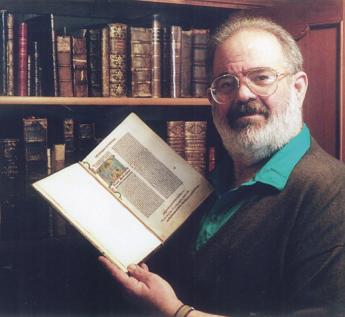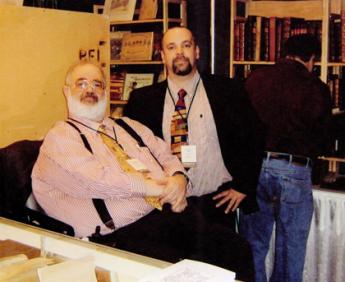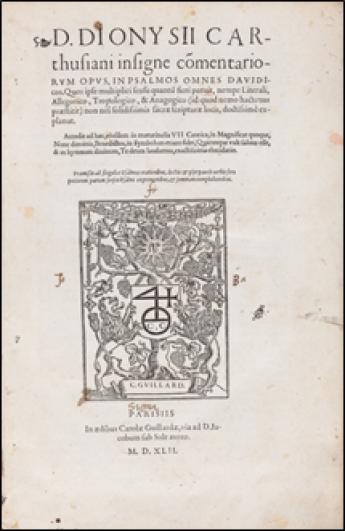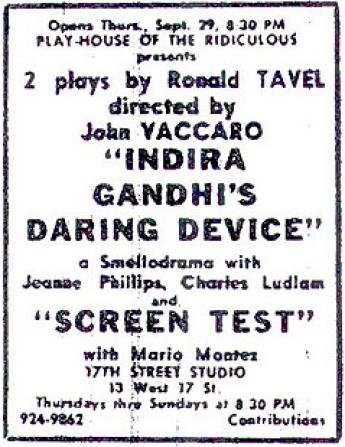Franklin Victor Spellman

By Jeff Weber
Franklin Victor Spellman was born August 15, 1945 in Stamford, Connecticut, moving to the Bronx, New York, at 8 years. He is named in honor of Franklin Roosevelt and his middle name was in celebration of V-J day. Although Jewish, he was born in a Catholic hospital where the nuns prevailed upon his mother to give him a middle name of Victor. He was not a fan of Roosevelt, but Franklin did love his name. He has an older brother Douglas Spellman, and a younger sister, Jill Polan.
Frank married Elizabeth, née Krown, March 15, 1969, the Ides of March, they were married close to 47 years.
Frank got his start in bookselling at Pageant Book Co., NYC, at 13 years of age, working on weekends, holidays, and summer vacation. As a child he loved science fiction, fantasy and horror literature. He wrote and produced with some schoolmates stories in these same fields. He even corresponded with the founder of Arkham House, August Derleth (1909-1971). He fostered friendships with several well-known writers in the genres of science fiction and fantasy literature. He started collecting Lord Dunsany (something he continued collecting throughout his life), took his Bachelor’s degree in History and English Literature at City College of New York, then continued at CUNY and earned his Master’s degree in English Literature. In 1970 Frank moved to Los Angeles, matriculating at UCLA’s Ph.D. program in English Literature. When he got his C.Phil., his own father was so proud of Frank and his accomplishment, far more than Frank himself. When his father would refer to “My son, the doctor,” Frank simply told people, “if it speaks Anglo-Saxon, tell it to take two aspirins and call me in the morning.” While still a student, he opened his first bookstore with a fellow classmate, using their middle names, calling it Demetrius & Victor, [with Aristide Demetrius Caratzas] offering scholarly books as well as involving themselves in at least three publishing ventures, issuing three books: Louise Dyer, editor, Plato: Apology of Socrates and Crito, LA, 1973 / Plato.; Louis Dyer; Thomas Day Seymour; Xenophon, Apology of Socrates and Crito with extracts from the Phaedo and Symposium and from Xenophon's Memorabilia, 1973 / Joseph Henry Allen; J B Greenough, Allen and Greenough's New Latin grammar for schools and colleges, founded on comparative grammar, 1973].

Krown & Spellman, Booksellers, first opened in August 1977, the beginning of the working partnership of Elizabeth Krown Spellman and Franklin V. Spellman. They took a $1500 bank loan, and offered their own personal books for sale to get started. The store was located on Westwood Blvd in West Los Angeles which was to become known as “Bookseller’s Row” [also present were Kenneth Karmiole, Howard Karno, Hyman & Sons Rare Books, George Houle, Vagabond Books, La Cité des Livres, Hennessey & Ingalls, Sam: Johnson’s]. From there Krown & Spellman moved to an alley off Westwood Blvd. The third move took them to the Third Street Promenade in Santa Monica where the store was ideally suited to books; it was 10 feet wide and 150 feet deep. “In the 1980s there were several other fine bookstores (Morrison & Kline, Ken Karmiole) and it was possible to make an entire day of book browsing in one or two blocks.” – Merle Bobzien. By this time the firm was a member of the ABAA. Another rent hike forced relocation to Robertson Blvd in Beverly Hills, where the shop stayed for five years. Recognizing the direction of internet, it was possible to do a viable business from home, thus the store moved to their front house at 3319 Cattaraugus Ave, Culver City, California. Through the years, Frank’s stock was focused on early English printing, occultism, early science, and always a selection of antiquarian and scholarly books. The firm produced at least 44 catalogues, including a selection of rarities that marked Krown & Spellman as a unique bookstore where early printed books were available in unusually large numbers for a California shop.
Some of the best books Frank handled included a first edition of John Dee’s A True and Faithful Relation... London: Garthwait, 1659, a 1490 edition of Malleus Malificarum, several editions of Scott’s Discovery of Witchcraft, most of Jacob Boehme first editions, as well as a constant supply of Athanasius Kircher and Robert Fludd. He was best known for his wide selection of English imprints from the STC/Wing period, probably the largest stock available in the United States. He bought and sold two copies of Shakespeare’s fourth folio, a first edition of Newton’s Principia, 1687, and a first edition of Holinshed’s Chronicles, 1577. Highlights from Frank’s shop in science and early imprints included first editions of Galileo’s Dialogo, 1632, Gilbert’s De Magnete, 1600, Descartes’ De la Methode, 1637, Jacobus de Voragine, Legenda Aurea (Golden Legend), 1468, and Schedel’s Nuremberg Chronicle, 1497. In addition he sold several complete 15th century Books of Hours.
Frank’s store offerings clearly reflected his personal interests and his sense of the rare, unusual and intellectual works of all periods, but in particular the earlier ones. He built probably the largest collection of books by the first important woman printer, Charlotte Guillard (d.1557), who also married a bookseller. Other books were available on demonology, witchcraft, the occult, Medieval subjects, such as magic, astrology and alchemy. Frank also co-sponsored some fourteen reprints with Maurizio Martino, who writes, “Frank was a consistently gracious and positive influence in my life.” These included: Jerome Brooks, Tobacco: Its History Illustrated in the Library of George Arents [5 vols.]; Lipsius, Bibliotheca Numaria; Kernot, Bibliotheca Diabolica; Fairfax-Murray, Catalogo dei libri posseduti da Charles Fairfax Murray; John Ferguson, Catalogue of Books Relating to Alchemy, Chemistry, Witchcraft and Gipsies; Stanislas de Guaita et sa Bibliothèque Occulte; Gelli, Bibliografia Generale Della Scherma; Max Dessoir, Bibliographie des Modernen Hypnotismus; A.S. Uvarov & A. Ladrague, Sciences Secretes; John Ferguson, Bibliotheca Paracelsica; Ferguson’s Some Early Treatises on Technological Chemistry; and Heawood, Watermarks of the 17th & 18th Centuries. Paul Naiditch, a long-time bookman and authority on A.E. Housman and classical scholarship, wrote a volume entitled, Problems in the life and writings of A.E. Housman, which Frank published under his shop name in 1995. Frank, jointly with Oak Knoll and Martino, purchased the entire remaining stock of the Paper Publications Society, Amsterdam.
Some stores have a bit of business with the movie industry. In Frank’s case he was credited for book-use in a couple of films, including Will Smith’s “Ali” (2001), and “Sinner” featuring Brad Dourif (2007). Few in the book world know that Franklin was an actor who performed with the avant-garde Theater of the Ridiculous, an off-off Broadway group of some notoriety. Franklin received favorable reviews in the The Village Voice under one of his pseudonyms, saying “Dashwood von Blocksburg is funny.” Frank played the role of “Sheriff Thorold” in Ronald Tavel’s, “The Life of Lady Godiva,” directed by John Vaccaro, April 1966, the venue being either 12 or 13 West 17th Street in New York. Some of his other pseudonyms were “Porpo Glumpwart” and “Noah Vale.” Frank was also in the production of “Indira Gandhi’s Daring Device,” which caused an “international uproar.” [NY Times March 27, 2009, article on Ronald Tavel]. He joined the company, too, when they performed as go-go-dancers at an Andy Warhol “Happening.” As Warhol would not pay them, it was a one-time event [sometime between 1965-67]. In costume, both Frank and Elizabeth hawked antiphonal and bible leaves, as well as books and coins, at the Renaissance Faires. A friend still recalls Frank on stage in a UCLA revival of a play by Plautus; he portrayed a mute.


Ryan Parks, his long-time associate at the store, and its manager during its last years, states, “Frank was not only a mentor and second father to me, but a best friend.” He reflected on working with Frank, “… it was a pleasure. Every day was a day I learned something new. Every day was a day that I laughed or chuckled at something witty or sarcastic Frank would say. The man was a giant with a kind soul, and an even bigger heart. … I think Frank was … a realization of the medieval wizard-like bookseller. If you came into the shop at any moment, you would find him sitting in a large chair, smoking a pipe, deciphering an ancient text, and listening to a lute and a harp in the background.” Frank’s passion for music was expressed mostly in classical and opera. His vinyl record collection occupied half an entire room, the other half was the CD collection! The store closed late 2014 and much of the inventory and reference library has since been offered at Heritage Auctions beginning October 8, 2014.
A bookseller can do a lot for a city, and Frank was a cultural landmark. The presence of bookstores in the city achieved its zenith in his day. Now the literary landscape has changed and all booksellers have been changing accordingly. Frank made his mark as a bookseller, endearing himself and his shop to many colleagues and clients alike. Merle Bobzien, a devoted client and friend of Frank’s writes, “In this Internet Age, dealers and dealing, the lure of the hunt is changed. Browsing shelves and finding hidden treasures and “sleepers” was a rewarding hunt. Occasionally, a book would lie dormant on a shelf for years until somebody “discovered” it. Occasionally, it carried a price that was hopelessly behind the times, and so a bargain was found. I remember finding a 16th century Petrarch that had escaped Frank’s notice when I brought it up to the front desk. He had an “uh-ohhh” look, but was gracious enough to stand by the price. Years before that, I had bought a Paradise Lost from Frank, and a few days later, he called to tell me that he had mistakenly not noted that the book was missing a plate, and offered to immediately take it back. Honesty and fairness were the hallmarks of Frank’s trade. Many of his books were imperfect, but were described as such, and carried commensurate lower prices. If you couldn’t afford a Morgan or Huntington-level copy, at least you could have something that you could afford. Krown & Spellman was one of the most important sources of early printed books on the west coast. Frank worked with me (and his other clients) to help build a meaningful and quality collection… Frank was my mentor in antiquarian books and collecting them, and was the source and fountainhead of my first serious book purchases. Years later, on a serious note, Frank told me that our relationship wasn’t just that of bookseller and client; it was much more, and was a lifetime of friendship. He was so right… I will always remember Frank’s advice to me when he said, “You could be spending your money drinking it up. You could be whoring it. You could be putting it up your nose. But, buying books… it’s such a harmless vice.”
Franklin died November 8, 2015, as a result of two diseases, Inclusion Body Myositis, an untreatable, incurable, progressive muscle disease and Chronic Obstructive Pulmonary Disease [COPD]. Although his body failed, his mind was acute to the end. He is interred at the Mount Sinai Simi Valley Cemetery, Simi Valley, California. He is survived by his wife Elizabeth, his son and daughter-in-law, Alex and Tiffany, his brother Doug, and sister, Jill.
***
By Jeff Weber, with contributions by Merle Bobzien, Ryan Parks, Paul Naiditch. With deep appreciation to Elizabeth Krown Spellman.
